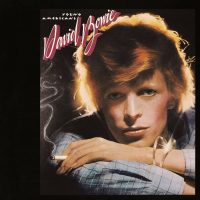 Recorded: 11–22 August; 20-24 November; December 1974; January 1975
Recorded: 11–22 August; 20-24 November; December 1974; January 1975
Producers: Tony Visconti, Harry Maslin, David Bowie
Engineers: Carl Paruolo, Eddie Kramer, Harry Maslin
Released: 7 March 1975
Personnel
David Bowie: vocals, guitar, keyboards
Carlos Alomar, Earl Slick: guitar
Willie Weeks, Emir Ksasan: bass guitar
Mike Garson: piano, keyboards
David Sanborn: saxophone
Andy Newmark, Dennis Davis: drums
Pablo Rosario, Ralph McDonald, Larry Washington: percussion
John Lennon: vocals, guitar, piano
Luther Vandross, Robin Clark, Ava Cherry, Anthony Hinton, Diane Sumler, Warren Peace, Jean Fineberg, Jean Millington: backing vocals
Tracklisting
- ‘Young Americans’
- ‘Win’
- ‘Fascination’
- ‘Right’
- ‘Somebody Up There Likes Me’
- ‘Across The Universe’
- ‘Can You Hear Me’
- ‘Fame’
Young Americans, David Bowie’s ninth studio album, was the soul-influenced follow-up to Diamond Dogs and David Live, and was recorded in Philadelphia and New York.
My Young American was plastic, deliberately so, and it worked in a way I hadn’t really expected, inasmuch that it really made me a star in America, which is the most ironic, ridiculous part of the equation. Because while my invention was more plastic than anyone else’s, it obviously had some resonance. Plastic soul for anyone who wants it. We really worked hard to make that record come alive.
David Bowie: A Life, Dylan Jones
Bowie’s love of American soul and R&B had been evident in the television special The 1980 Floor Show, and elements of Diamond Dogs. An early recording for that album was ‘1984’/‘Dodo’, which was produced by Ken Scott.
When we were recording Diamond Dogs we worked on the song ‘1984’, and he was already referencing Barry White. He wanted the hi-hat and the strings to sound like they would on a Barry White record. He was already anticipating the sound of Young Americans. He had already moved on.
David Bowie: A Life, Dylan Jones
Young Americans was Bowie’s attempt to have a major hit album in the United States, which had thus far eluded him.
My own recent music has been good, plastic soul, I think. It’s not very complex, but it’s enjoyable to write. I did most of it in the studio. It doesn’t take very long to write… about ten, 15 minutes a song. I mean, with Young Americans I thought I’d better make a hit album to cement myself over here, so I went in and did it. It wasn’t too hard, really.
Melody Maker, 1 March 1976
The desire for commercial success was partly due to problems with Bowie’s management company MainMan, which had for years been overspending money, leaving the singer with little of his own.
Bowie’s financial problems also led him to take up residency in America, in an attempt to avoid tax in Britain. He had arrived in New York on the SS France in April 1974, and stayed for nearly two years.
I didn’t have any money to get out. I was told I couldn’t go back to England because I had tax problems there and didn’t have the money to pay them, but now I do, so I’m going back. Unfortunately, I’m going to have to live in Switzerland, because I want to keep my money. I’d like to live in England because I don’t like America at all as a place to live, except maybe New Mexico.I haven’t lived properly in America. I’ve been here but I haven’t lived. I’ve been in Los Angeles, coping with a town that I consider to be the most repulsive wart on the backside of humanity. I’d rather live here in Detroit than in Los Angeles.
Melody Maker, 1 March 1976
Various working titles were considered for the album, including The Young American, Shilling The Rubes, Dancin’, Somebody Up There Likes Me, One Damn Song, The Gouster, and Fascination.
The original title for the Young Americans album at one point was Shilling The Rubes, which is circus slang for taking money off people. I was advised that my stunning wit would not go down well.
50th birthday live chat, AOL

